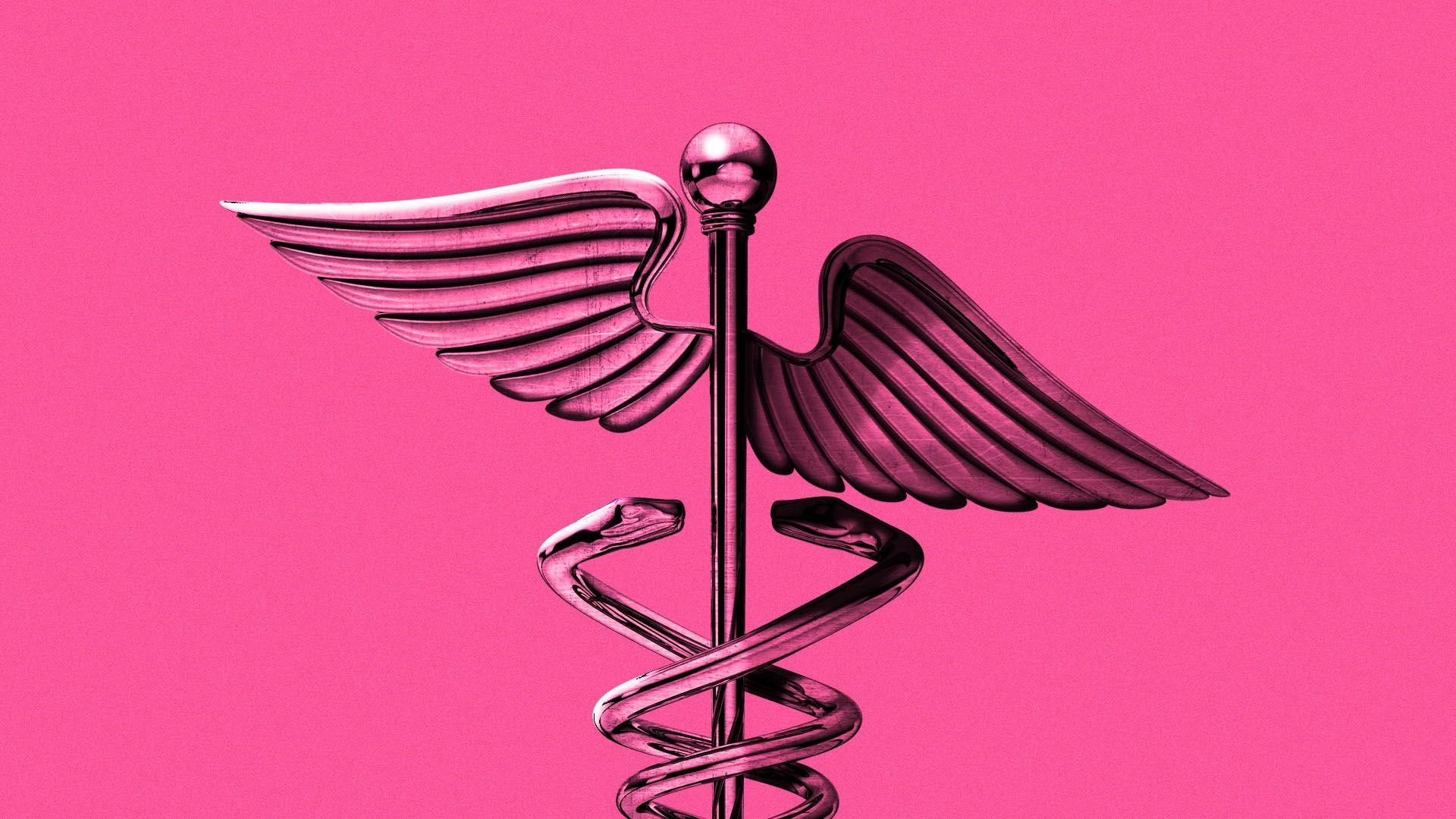Plus, researchers creating scoring for patients' risk for common diseases | Tuesday, April 19, 2022
| | | | | | | | | | | Axios Vitals | | By Tina Reed · Apr 19, 2022 | | Good morning, Vitals readers. Today's newsletter is 891 words or a 3-minute read. Situational awareness: A collection of health care organizations including the Association of Black Cardiologists and the Black Women's Health Imperative are announcing the launch of the Health Equity Coalition on Chronic Disease today. Their first-year initiative will focus on improving access to care for obesity. - Speaking of health equity: Join Axios' Kristal Dixon and Russell Contreras today at 12:30pm ET for a virtual event examining how social determinants impact health outcomes. Register here.
| | | | | | 1 big thing: Hospitals' massive cancer drug markups |  | | | Illustration: Aïda Amer/Axios | | | | The prices that private insurers agree to pay hospitals for cancer drugs are often at least double what the hospital paid to acquire the drugs, Axios' Caitlin Owens reports from a new study in JAMA Internal Medicine. Why it matters: The blame for high drug prices goes well beyond drug manufacturers and is ultimately borne by patients through higher premiums and out-of-pocket costs. The big picture: Patients generally either get their prescriptions drugs from pharmacies or administered directly in a hospital or doctor's office. - Both pathways have complicated supply chains, meaning there are multiple middlemen between drug manufacturers and patients.
- But the JAMA study published yesterday suggests that hospitals also have a huge role in what patients and insurers pay, at least in the oncology space, where treatment courses can cost hundreds of thousands of dollars.
Details: The study analyzed the prices of 25 top-selling cancer therapies at 61 National Cancer Institute-designated cancer centers, and looked at how those prices compared to acquisition costs. - Median price markups ranged 118% to 634% above the estimated acquisition cost. Prices varied widely between cancer centers and even between payers within the same center.
- Put another way, for every single drug included in the study, the median hospital negotiated price was at least double its acquisition cost.
- That means private insurers are paying much more for the administered drugs than Medicare is.
The other side: Hospitals may be using profit from cancer drugs to subsidize other lines of business that are less lucrative, like research and development that isn't federally funded or providing uncompensated care. - "The question is, is this really the right way to do it?" said Vinay Rathi, a physician and health policy researcher at Massachusetts Eye and Ear and one of the study's authors.
Go deeper. |     | | | | | | 2. Scoring the risk for common diseases |  | | | Illustration: Sarah Grillo/Axios | | | | Researchers developed a genetic-risk "score" for six common diseases such as Type 2 diabetes and breast cancer which they say could help doctors and their patients make better health decisions, according to a study published in Nature Medicine. Why it matters: In the effort to deliver precision medicine, studies have identified thousands of genomic variants linked with a range of common complex human diseases. But individual genetic changes, on their own, don't always provide much information. - When hundreds or thousands of small risks are added up, it could provide more clinically meaningful information for a patient, researchers say.
But, but, but: Compiling all of those risks can be unwieldy. - Researchers from Brigham and Women's Hospital, Veterans Affairs Boston Healthcare System, and Harvard Medical School say they developed and validated what are called polygenic risk scores for atrial fibrillation, coronary artery disease, type 2 diabetes, breast cancer, colorectal cancer, and prostate cancer.
- They also created resources about how doctors can integrate them into clinical care.
- "We wanted to design a lab report and informational resources that succinctly told the doctor and patient what they need to know to make a decision," corresponding author Jason Vassy of the Brigham's Division of General Internal Medicine & Primary Care said in a statement.
What's next: They plan to enroll more than 1,000 patients in their study to observe how they and their primary care providers use the risk scores. |     | | | | | | 3. Quote du jour | | "This almost feels like it's battlefield triage. If you reach that point ... it's haunting. [If] I had the resource, I could've offered it, the person could've lived longer, but I had to make a choice. And those kinds of choices come with a very heavy, heavy moral price." — An ethicist quoted in a study published in JAMA Network Open who participated in a simulation of allocating scarce resources to patients during COVID-19 pandemic. |     | | | | | | A message from Axios | | Every deal, every development, every day | | |  | | | | Gain a deeper understanding of everything transforming health tech with Axios Pro. Why it matters: Deeply-sourced Pro reporters Erin Brodwin and Sarah Pringle are on the front lines, breaking stories and delivering expert analysis every day. Use code PRO200 at checkout to get $200 off your subscription. | | | | | | 4. A fun thing: A cold dip for science |  | | | Members of the "Submergents" stand in a "pool" carved out of ice at Lake Harriet in Minneapolis in January. Photo: Kerem Yucel/Anadolu Agency via Getty Images | | | | There's a group 0f Minnesotans who get together regularly to plunge themselves in the icy waters of a local lake for at least three minutes — and now researchers plan to study them, the Minneapolis Star-Tribune writes. Driving the news: The plungers say they keep coming back for the mental health and physical benefits from the frigid challenge. - Researchers from the Rockefeller University's Cohen Laboratory of Molecular Metabolism already examining whether cold therapy might be associated with changes in cardiometabolic health say the plungers could help validate their work, the Star-Tribune reported.
- "A wealth of anecdotal evidence suggests a number of health benefits in individuals practicing exposure to environmental cold, including reduced inflammation, improved blood flow, reduced fat mass and overall improved metabolism," Kaja Plucinska of Rockefeller University said in a statement.
The bottom line: This is a fun piece of science. Hats off to Axios Twin Cities reporter Torey Van Oot for pointing this one out. |     | | | | | | 5. Catch up quick | | ✈️ A slew of companies — including the airlines Delta and Southwest, as well as Amtrak and the ridesharing company Uber — will stop requiring masks after the TSA said it will stop enforcing mandate. It came following a federal judge striking down the rule on Monday. (Axios) 📈 The Biden administration proposed a 3.2% increase for inpatient hospital payments — a $1.6 billion total increase. But some hospital groups complain it doesn't reckon for inflation, a staffing crisis and the continuing pandemic. (CMS) 💵 A long-term care benefit program in Washington state, set to be the first in the nation, has been delayed. (KHN) ⚖️ The Supreme Court tossed cases disputing the Trump administration's approval of Medicaid work requirements on Monday, saying the rules are now moot. (Bloomberg Law) |     | | | | | | A message from Axios | | Every deal, every development, every day | | |  | | | | Gain a deeper understanding of everything transforming health tech with Axios Pro. Why it matters: Deeply-sourced Pro reporters Erin Brodwin and Sarah Pringle are on the front lines, breaking stories and delivering expert analysis every day. Use code PRO200 at checkout to get $200 off your subscription. | | |  | It's called Smart Brevity®. Over 200 orgs use it — in a tool called Axios HQ — to drive productivity with clearer workplace communications. | | | | | | Axios thanks our partners for supporting our newsletters. If you're interested in advertising, learn more here.
Sponsorship has no influence on editorial content. Axios, 3100 Clarendon Blvd, Suite 1300, Arlington VA 22201 | | | You received this email because you signed up for newsletters from Axios.
Change your preferences or unsubscribe here. | | | Was this email forwarded to you?
Sign up now to get Axios in your inbox. | | | | Follow Axios on social media:    | | | | | |







No comments:
Post a Comment